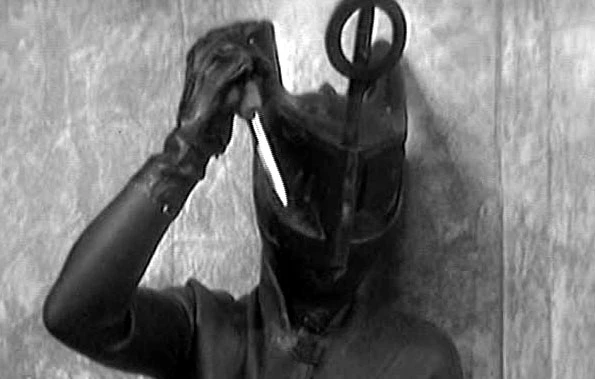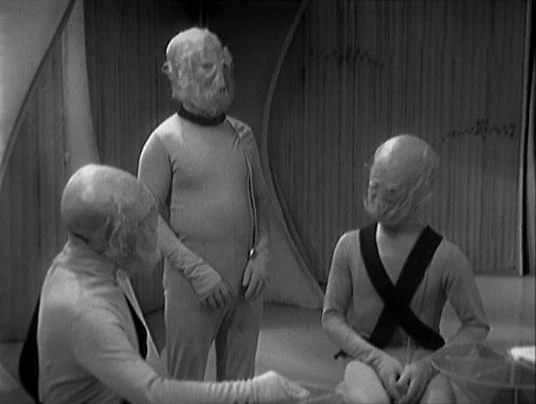Decided to, you know, what classic Doctor Who in its entirety. Makes sense seeing as how I'm almost caught up in my big Simpsons project.
An Unearthly Child AKA
100,000 BC AKA
The Tribe of Gum
In this serial, school teachers Ian Chesterton and Barbara Wright are completely confounded by their student Susan Foreman. More so, Barbara found out her address simply leads back to an old building. The two investigate and meet an impish old man and see an old police box. Sensing the old man is hiding something in the police box, Ian barges into it when he hears Susan's voice. Ian and Barbara are shocked to discover it is bigger on the inside and seems lightyears ahead of Earth technology. The old man, calling himself the Doctor (and not Doctor Foreman) claims he and Susan are exiles from another place and time that the police box, called the TARDIS, can travel in time and space. Ian is mocking and in his anger (and wanting to make sure not one spills the beans on him), the Doctor sends them into the distant past to prove it.
The foursome look around when the Doctor, while smoking his pipe, is kidnapped by a caveman. It turns out his tribe is desperate to make fire and their current leader is in a power struggle with an outsider for leadership. Whoever controls fire will basically clinch it and when the Doctor lit his pipe, he proved he could make fire. The others are captured when they look for the Doctor but manage to escape for a time, though not before saving the life of one of the cavemen. Eventually, they make fire but the tribe's leader insist they stay forever. Eventually, they escape with a ruse and make it back to the TARDIS. The Doctor, not having time to set coordinates, sends them someplace random and they go out to investigate, unaware of suddenly spiking radiation levels.
Sorry for the lack of clarity in my recap but I genuinely got the two leaders Za and Kal mixed up a LOT and in reading the wikipedia page was like "Wait, I though they saved the outsider? What's happening?"
Overall, this is a pretty strong first outing, more than I remember. Oh, it has plenty of faults but the good points shine brighter. It never gets better than that first episode, which despite being talky, really sets the mood and premise up well with a killer cliffhanger. The Doctor is very much a different character here than he will become but at the same time when he first arrives, his playfulness is unmistakably the Doctor. There's really a lot in the Doctor Who premise to be unloaded and later seasons would be able to streamline this well but it's nice to have the time to sit in the mystery of this old man and the TARDIS; far from the often frantic pacing of the more recent episodes. Neither is a bad approach mind but it reminds me of how Simpsons season 2 has a tone the show will never go for again, both for better and yet there's a beauty to that time.
The caveman story is a mixed bag but I actually think it's trying for something heady. Granted, the idea of primitives and savages is a simplistic and somewhat problematic one (not to be confused with the VERY OVERTLY problematic ideas the show will have in it's first four years) but I think it is a story with a point about how far we've come, that we got democracy on our side. While the newer series isn't cynical, I don't think it would be quite that blindly optimistic, considering we've seen democracy abused pretty badly in our time but it's the idea that mercy and sharing makes us strong. I wish it did something more. No one even does a redemptive turn after the heroes save them or even a surprise betrayal. The cavemen think about it for a bit and then move on.
The show wants to get a bit Shakespearian in the cavemen power plays but despite the grandiose dialogue, the story is a little too simple to really work. Again, I like when they gesture to ideas like "he's not more powerful than the whole tribe", a warning Kal (or... Za?) ignores and... it never really comes back? Feels like it should have. The writing keeps sidling up to something headier and I think that's intentional but then it drops it in favour of the villains being more simplistic. You'd think an encounter with the future who are showing signs of empathy they did not care to might inspire them and in a later Doctor Who serial, it would. After all, in later stories, it's rare the Doctor doesn't allow whoever he encounters to change for the better. In a lot of the older ones, particularly the historicals, the characters get themselves into a mess, accidentally create a little history, then flee to the next adventure.
The Doctor as a character is interesting here; he's a lot less on the ball and more inhumane to people who aren't Susan. Frankly, it's part of the reason there are a lot of retcons of the Doctor's past I'm not into that implies he's a much bigger deal; I feel like it is more interesting he's a minor exile who makes this quest and discovers his humanity, which becomes his whole thing going forward. He very much has an arc, even though it is less due to intent and more fine tuning and softening the character as the series goes on. Still, this Doctor has an edge and at this point, it might seem like he'll just leave Ian and Barbara behind should he wish. This version actively chooses wanting to kill Za... or Kal... or whoever, rather than save them, very different from who the character becomes. If anything, it continues the show's modern recurring idea of how much the Doctor needs his companions (interestingly, he uses the word in this episode in a way where you are like "oh, yeah, that's why that became the term.")
The escape is the most embarrassing part of the episode. Susan puts a skull on a torch and chirps "it's like it's alive". No Susan. It's not like that at all. Also, even though fire is unfamiliar to these guys and they seem dense, I don't feel like they would immediately assume four skulls on sticks are full on people who burned themselves to death. It's a wild assumption.
Overall, I feel like this one is not paced as badly as I remember but that might be because for my issues, I don't mind the talky bits. It does have some time killing trek scenes that I remember of the early series but even that isn't so long. It probably could be a bit shorter, maybe a three episode serial but as it is, even after the strong first episode, it isn't bad.
Next time!





